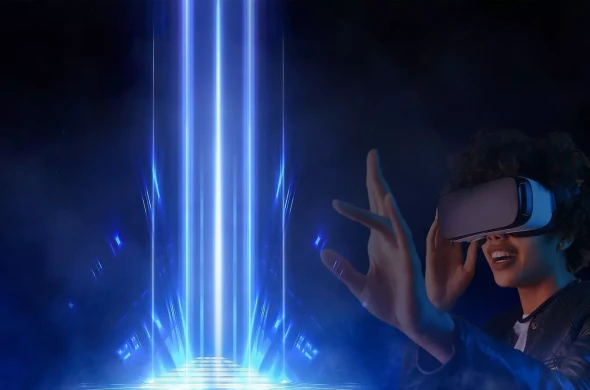There’s been a lot of developments that have dominated the news landscape this past year. From political snafus to stock market fiascos, and especially the ever-present pandemic issue, it seems like 2021 had no shortage of newsworthy events that change the world as we know it.
One of the changes that occurred in this past year was Facebook’s shift towards their new company, Meta, as well as their stated purpose to push further the concept of a functional and fully immersive “metaverse”. But the concept of a metaverse is still largely up in the air despite the many efforts to try and fully define it, and its future remains just as obscure regarding its ultimate defining features.
Yet with each passing year, we slowly begin to understand what the metaverse will be as well as the aspects of our current culture that already reflect its growing influence. This article will focus on the Metaverse, its history, its current state, as well as its potential in the future.
What is the Metaverse?
The metaverse could look like a difficult concept to grasp due in part to its general newness and internet-encompassing nature, but the best way to describe the concept of a metaverse is to view it as a fully digital immersive experience for users to participate in. This definition is still relatively broad, however, as many current technologies fall into this descriptive category. From video game worlds in Roblox and Fortnite to massively online social experiences in Second Life, each iteration of a virtual environment that utilizes digital identity to interact with other participants can be understood as individualized versions of a “metaverse”.
Still, saying any one of these environments makes up the entirety of the metaverse experience is like calling Facebook the only “social media environment”, cutting out other platforms like Twitter and Reddit. This is one of the main reasons Facebook had reinvented itself as Meta in an effort to introduce some form of interoperability within metaverse platforms. This means that the metaverse that Facebook aims to develop is one that can utilize different technologies and virtual capabilities across their services, from their Horizon work developments to their new Portal TV technologies.
Overview of AR and VR
One of the key aspects that makes metaverse a truly revolutionary innovation is its focus on the integration of Virtual Reality (VR) and Augmented Reality (AR), as well as newer Mixed Reality (MR) and Extended Reality (ER). With Meta’s investment in the Ocular Rift (soon to be known as Meta Rift) as well as developments with other reality-changing devices like the HTC Vive and Google Glass, we can expect to see more ways that the metaverse will slowly permeate our daily lives.
Virtual Reality (VR)
VR is best described as that in which you fully immerse yourself in a digital environment through peripherals like goggles and controller handles. Mostly seen in video games that support the technology, VR technology is also being used in certain work environments to better immerse employees within their tasks and manage remote set-ups with more familiarity.
Augmented Reality (AR)
With VR comes AR, a virtual technology that works with more commonplace items like phones and cameras. Essentially Augmented Reality adds a layer of virtual images over existing physical reality to better communicate additional information without sacrificing your view of the actual environment.
Mixed Reality (MR) and Extended Reality (ER)
Mixed Reality is essentially blending the key aspects of both Virtual Reality and Augmented Reality, with the Google Glass being the best example of the concept in practice. Mixed Reality is best defined as allowing the virtual reality experience with a full peripheral set-up while maintaining awareness of your actual surroundings.
Extended Reality goes beyond that and includes current and future interpretations of digitally augmented reality systems. Some of these include augmented reality’s capabilities for layering on top of physical world images with models to better understand how certain items work in relation to the space they are in. Extended reality essentially acts more of a catch-all term for the applications of VR, AR, and MR in our daily lives.
The new capabilities within the Meta metaverse
While the metaverse may seem like a novelty to most, its capabilities to redefine the years to come are massive. In 2022, we can expect more progress to be done on the current iteration of Meta’s Horizon Workrooms, the company’s approach towards how remote work can be done in a more digitally enabled world. Along with Meta’s investment in VR and AR technologies, the Horizon Workrooms can make bring the experience of virtual conferences much closer to traditional meeting spaces with a digital twist. You can now utilize digital avatars to interact with colleagues and develop better collaboration through virtual tools and spatial audio features.
The other current metaverses
Beyond Meta’s area of their Metaverse, there are also several other types of virtual spaces that are attempting to push the boundaries on what can be done within the current interest in the entirety of the metaverse and its development. One of these developments was an independent group’s reportedly large virtual real estate purchase of almost $2 million within Decentraland, another virtual platform. More investments are bound to be on the way in 2022 while the related NFT trend that acts as its backbone continues.
These different investments have also motivated celebrities to join in the trends, with further investments by popular figures following Snoop Dogg’s investment of $450,000 in his own Snoopverse just inevitable in this year.
While the metaverse remains fairly in its development, the many different current technological advances, and subsequent consumer acceptance, have indicated that the move towards metaverse is in a constant trajectory towards the future.
While companies might be the first ones to make a big move towards these newer technologies, as individuals we should be ready for the many different developments in technologies that can challenge (and even supplant) how we do things. Whether it how we work, how we shop, or how we talk to each other, you should be ready to learn the many potential new systems that will arise alongside the metaverse.
Technology Consulting Services
At Ollen Group, our strategic innovation management consultancy services are up to date with latest technological innovations, and the necessary steps needed to find success in the future - including the development of different aspects to be part of the metaverse and cope with the demand for digital progression. Ollen innovation strategy consultant and technology consultancy services offer turnkey industry consulting solutions from strategy to execution, as well as design, development, and deployment.
Read our latest insights, ideas, and perspectives that explore the trends shaping the future of business and society. Our consultancy services go hand-in-hand with these insights, confirming our position as industry leaders. Get in touch to find out more about our consulting services and industry expertise.


